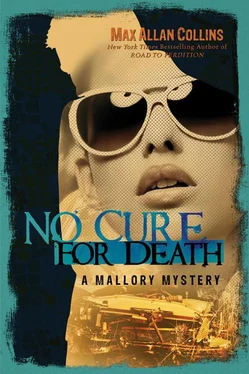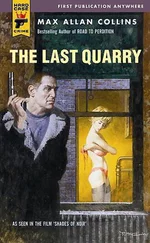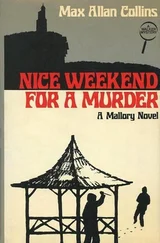Max Collins - No Cure for Death
Здесь есть возможность читать онлайн «Max Collins - No Cure for Death» весь текст электронной книги совершенно бесплатно (целиком полную версию без сокращений). В некоторых случаях можно слушать аудио, скачать через торрент в формате fb2 и присутствует краткое содержание. Год выпуска: 2012, Издательство: AmazonEncore, Жанр: Криминальный детектив, на английском языке. Описание произведения, (предисловие) а так же отзывы посетителей доступны на портале библиотеки ЛибКат.
- Название:No Cure for Death
- Автор:
- Издательство:AmazonEncore
- Жанр:
- Год:2012
- ISBN:нет данных
- Рейтинг книги:4 / 5. Голосов: 1
-
Избранное:Добавить в избранное
- Отзывы:
-
Ваша оценка:
- 80
- 1
- 2
- 3
- 4
- 5
No Cure for Death: краткое содержание, описание и аннотация
Предлагаем к чтению аннотацию, описание, краткое содержание или предисловие (зависит от того, что написал сам автор книги «No Cure for Death»). Если вы не нашли необходимую информацию о книге — напишите в комментариях, мы постараемся отыскать её.
No Cure for Death — читать онлайн бесплатно полную книгу (весь текст) целиком
Ниже представлен текст книги, разбитый по страницам. Система сохранения места последней прочитанной страницы, позволяет с удобством читать онлайн бесплатно книгу «No Cure for Death», без необходимости каждый раз заново искать на чём Вы остановились. Поставьте закладку, и сможете в любой момент перейти на страницу, на которой закончили чтение.
Интервал:
Закладка:
Not that the rest of him wasn’t striking at first glance: there was the way he was dressed, too. He had on black leather pants and a yellow-dyed buckskin coat-they were big on the West Coast for a week or two that year-with the longest hanging fringe I’d seen since the day Roy Rogers came to town when I was six. An open-collared blue shirt was showing under the coat, and a gaudy multicolor scarf was tied in a confident knot around his neck. Only his short black hair, his erect posture and the stride he used as he approached me might tip you to his being an Army sergeant arriving home on leave.
We clasped hands firmly and used our free hands to grip each other’s shoulder.
“Hello, Mal.”
I looked at his clothes and shook my head and laughed, and that patented smile of his gradually fizzled into an embarrassed grin.
“John,” I said, “you do tend to overcompensate when you’re out of uniform, don’t you?”
“Come on, I’ve been stationed in California, Mal, you know that.” His smile edged over onto one side of his mouth. “And I’ve always been one for mixing with the natives.”
“Don’t give me that crap,” I said. “You dress like that hoping some hard case in a bar’ll call you a hippie and hand you an excuse for breaking a table over his head.”
“Mal, you don’t really think that.”
“Of course, some of it may have to do with a uniform not having the charm it once had for those young California girls.”
“Maybe a little,” he admitted.
That was not to mention, I thought, the certain kind of girl a uniform still can attract in California, something John had learned all too readily out there several years before, prior to our leaving for his first (and my last) Vietnam tour. Like too many guys to mention, John got hit by one of those pretty hustlers who marry service men, milk them while they’re overseas and then divorce them. In John’s case it was even worse: his had a kid by somebody else while he was gone, which didn’t do his head a lot of good.
I reached down and picked up one of his bags and left him with the other bag and the clothes-carrier. He gathered them up, then turned and looked across the four lanes of Mississippi Drive, standing on his toes to see beyond the railroad tracks to the waterfront parking lot, where the edge of the river was lapping up onto the cement incline. The river was smooth today. John turned back and his smile said glad-to-be-home, and he said, “You got a car, kid?”
“Yeah, it’s up the block.”
“Lead the way.”
“Forward march, you mean?”
“Don’t get cute.”
We walked a few steps and John said, “Is it cold, or am I just used to that sunny weather?”
“It’s cold.”
“Why’re you stopping?”
I had stopped in front of a battered yellow Rambler, three or four years old. “Because,” I said, “this is my car.”
“This is your car.”
“That’s right.”
“You’re serious.”
“I’d have to be.”
We stowed his stuff in the back and John said, “Whatever made you pick a self-proclaimed lemon like this?”
“Saves money on gas,” I shrugged. “And it didn’t cost much to begin with.”
“But I thought your folks left you a bundle, Mal. And since when are you frugal?”
“Jesus, you Army types are a tactful lot, ain’t ya?”
I got behind the wheel and John got in on the other side and I pulled out of the parking place and drove half a block and waited at a red light.
“Tell you the truth,” I said, “I went through a lot of that cash my folks left me in the first year after they died. One of the things I wasted it on was one of those damn fiberglass ’Vettes, which I totaled within a month of buying it. Lately I’ve decided to make my money last a while, what’s left of it, so I can coast as long as possible without succumbing to taking-how you say? — gainful employment.”
The light went to green and I turned right on Second.
John said, “I had an MG out in California for a few months. The payments broke me, and the speeding tickets didn’t help, either. I was even in jail once.”
“How fast were you going?”
“Hundred ’n’ forty. I was dressed like this, you know? They treated me like garbage, until they found out I was an Army sergeant and then they almost apologized for stopping me. Hypocritical bastards.”
“But that was after they jailed you?”
“Just overnight. Didn’t have any identification on me. Jail was no big deal after living over one as long as I did.”
“That reminds me, your stepdad wants to see you. Want to swing by his office?”
“Naw,” he said, “just as soon grab a beer or something first. How about we go out to your place and shoot the bull?”
“Fine.”
We started up the gradual hill that Second Street turns into as it leads into the part of town called East Hill. Port City’s your typical quiet little middle-class, industrial river town, with twenty-some thousand residents, whose only mild claim to fame is having a famous ex-resident in Mark Twain. As Sam Clemens, Twain used to edit the Port City Journal and had a house along the river front that he said in later years provided the most beautiful front-porch view of the sun setting on the Mississippi he had ever seen; a couple years ago the old house was torn down to make way for a Skelly station.
I wondered if Janet Taber really would call me when she got back. It wasn’t just that she was attractive, though that had something to do with it; but the story she’d told me about her mother and the house burning down, not to mention my encounter with that one-eyed nightmare in the terminal, made her rather like the beginning of a fascinating serial running in a magazine, the kind where you’re afraid you might screw up somehow and miss the next issue.
“I said the town hasn’t changed much,” John said.
“What?”
“Christ, two years to catch up on and all you can do is sit there daydreaming.”
“Oh. Sorry, John. Just thinking.”
“This is where I’m supposed to say, ‘What’s her name?’”
I grinned.
“Nice?” he asked.
“Not bad. She’s been through all hell lately, so she wasn’t looking her best, I’d wager.”
“Want to talk about it?”
I pulled onto Grand Avenue, which brought us within a few blocks of my trailer, and said, “Do you believe in hate at first sight?” And I told him about Punjab.
The Rambler and my account of the bus station brawl sputtered to a simultaneous halt in front of my housetrailer. John kind of grinned when he saw the trailer, but that didn’t bother me.
I liked my trailer.
I didn’t mind that it was a dinosaur of its kind. Just because its dull aluminum hull was battered here and there didn’t mean it lacked a heart-didn’t you ever see The Wizard of Oz? — and it was roomy for its age, probably the biggest model made during its period of our distant history. The old guy who lived in it before me obviously thought a lot of it, too, having used it as a lake cottage for years and years, then hauling it up onto this landfill vacant lot and moving in for good after his wife died. He had taken the time and expense to panel the walls, and put in a modern kitchenette. In fact, if the old boy hadn’t died, he’d probably still be in it, but his son, who I bought it from, hadn’t been nearly so sentimentally attached to it.
“Going to bunk in with me?” I asked John, wondering whether or not to haul his stuff inside.
“No. I better stay with Brennan. You can drive me over there later, if you don’t mind.”
“Sure.”
We started across the big yard, all its grass brown now with oncoming winter, toward the trailer. Even with its good size, the trailer looked small on the large and otherwise empty plot of land-an oversized beer can littering an undersized park. The neighborhood was otherwise middle-class residential, and my trailer was out of place-but nobody had wanted to build on the experimental landfill my trailer sat on. I figured that only after thirty years or so passed without my trailer sinking into the ooze would the folks I rented my space from want to move me out so somebody could build.
Читать дальшеИнтервал:
Закладка:
Похожие книги на «No Cure for Death»
Представляем Вашему вниманию похожие книги на «No Cure for Death» списком для выбора. Мы отобрали схожую по названию и смыслу литературу в надежде предоставить читателям больше вариантов отыскать новые, интересные, ещё непрочитанные произведения.
Обсуждение, отзывы о книге «No Cure for Death» и просто собственные мнения читателей. Оставьте ваши комментарии, напишите, что Вы думаете о произведении, его смысле или главных героях. Укажите что конкретно понравилось, а что нет, и почему Вы так считаете.












